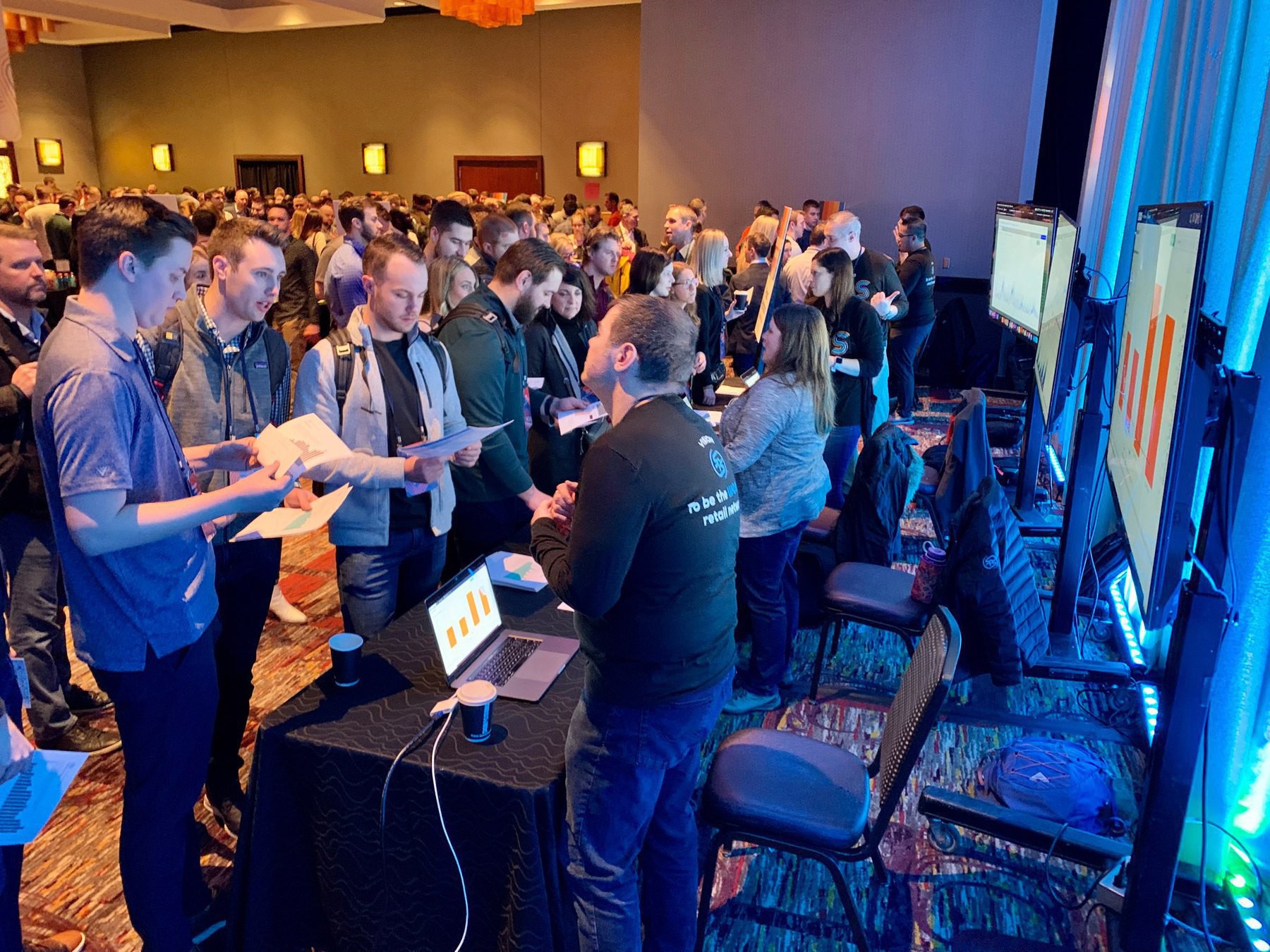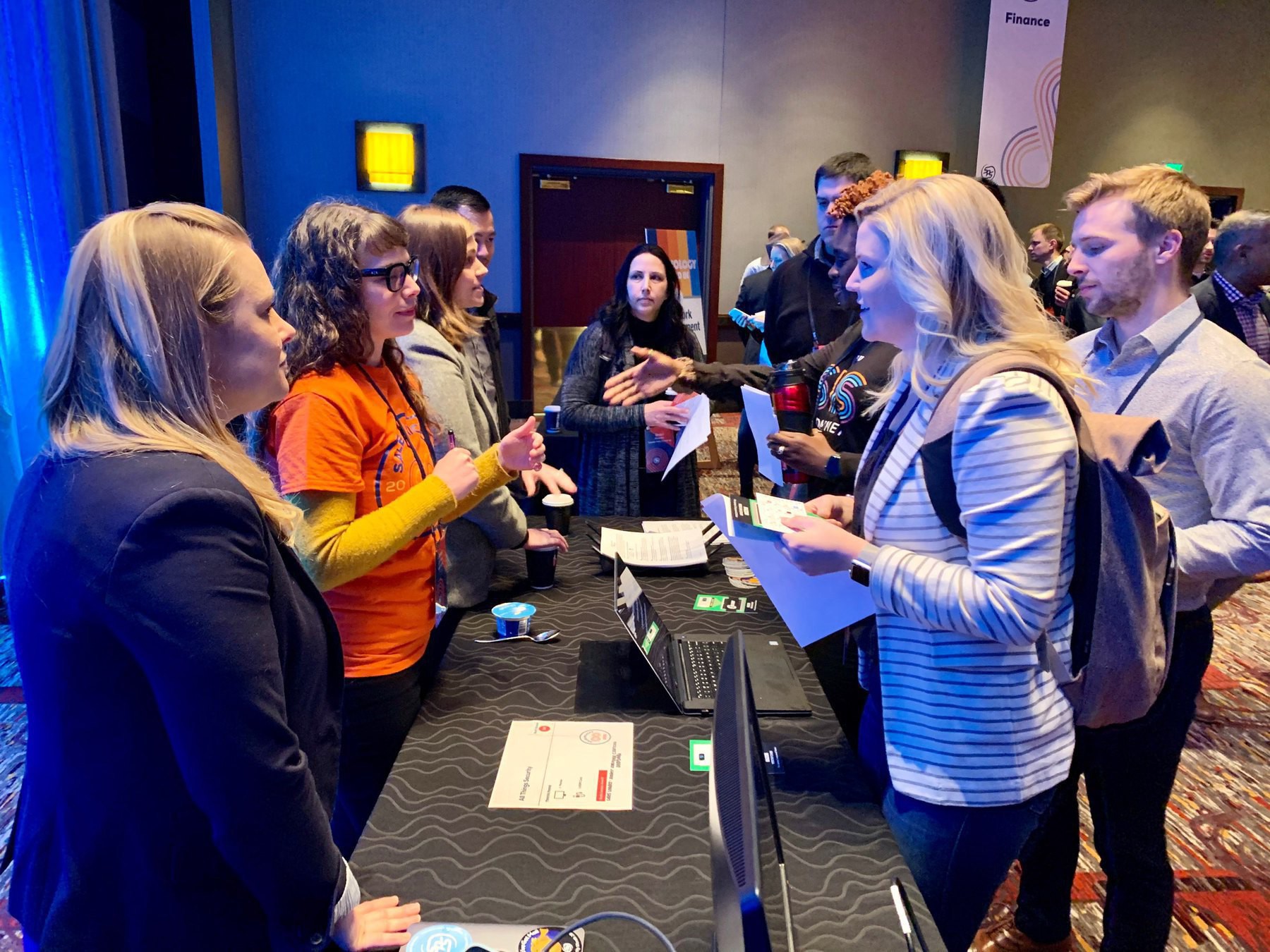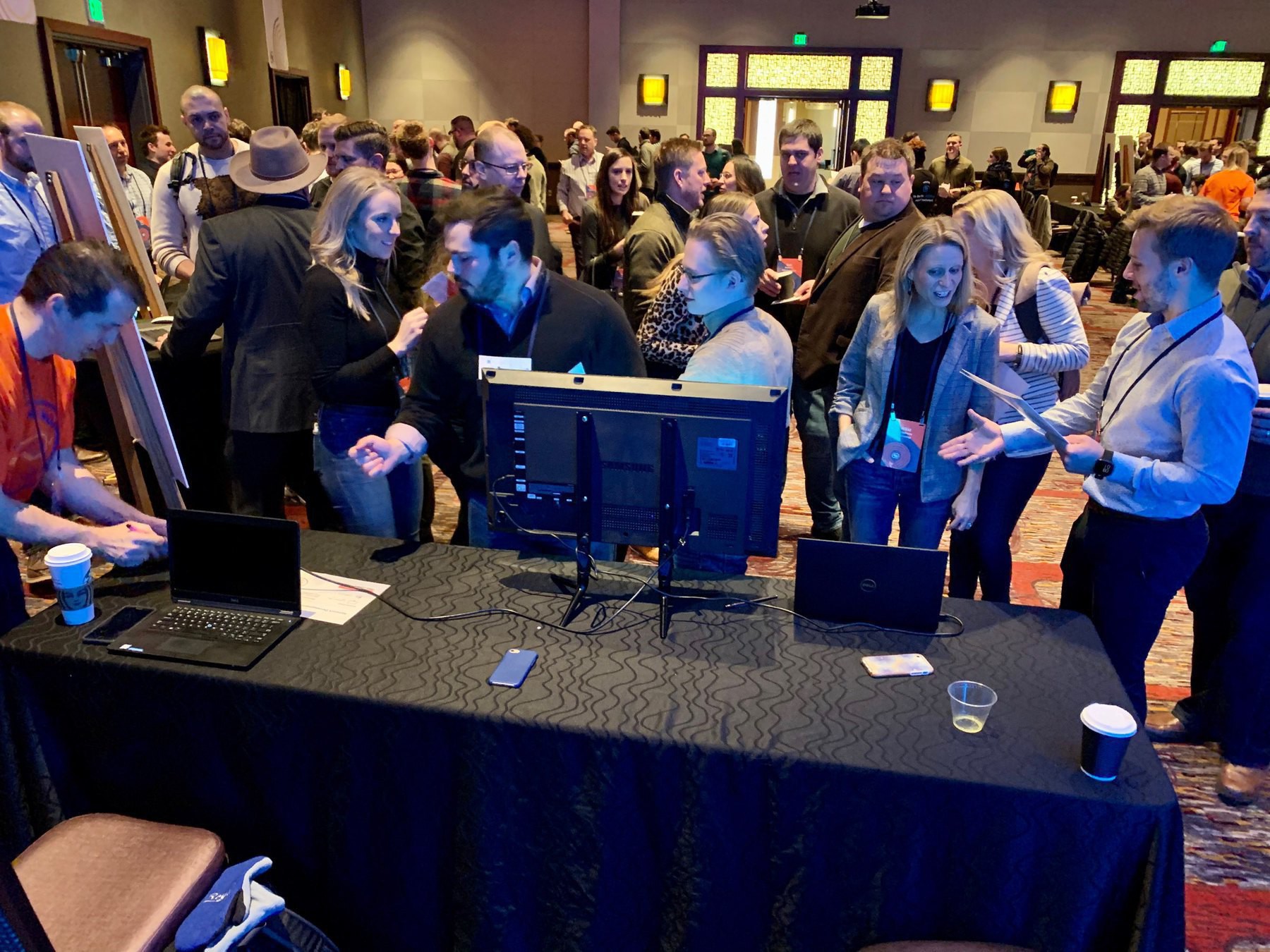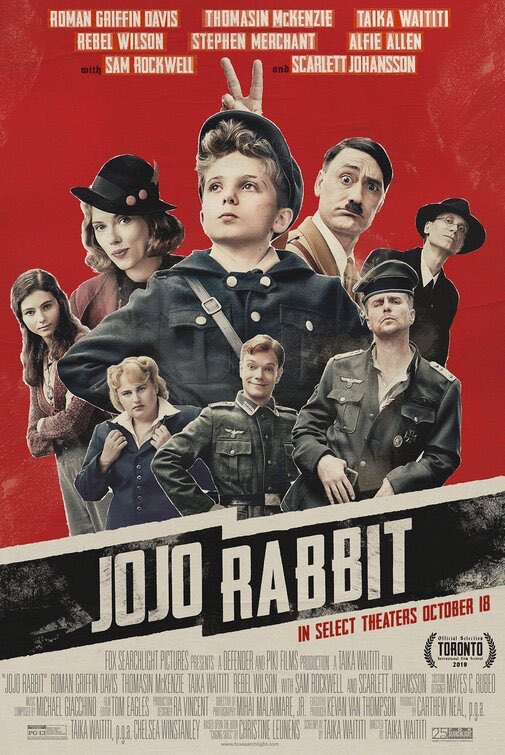Weekly Thing #134 / Platform & Product, Corporate Athlete, Mindfulness
Hi, I’m Jamie Thingelstad, and this is the Weekly Thing newsletter. Isn’t that witty? I send this weekly, and it is full of various things. What would I call it if my last name didn’t start with thing? I have no idea!
I’ve been surprised by how many people have reached out about reading poetry. It’s led to many recommendations of favorite poets, books, and some discussion around poetry. In one of these conversations, the assertion was made that “Poetry is a compression algorithm.” Not knowing much about poetry, but knowing a good amount about the utility of compression algorithms, this piqued my interest.
I find the assertion appealing, and I think there is some truth to the idea. It is, in part, what I’ve found compelling about poetry. You can have so few words, yet such big ideas. To sum up, some segment of the human experience into a few lines of poetry is an art form to be sure, a kind of compression. The compression yields benefits too. It is easier to share with others. It is certainly easier to remember.
But when I heard this assertion, I immediately had an amendment. If poetry is indeed a compression algorithm, it is most certainly a lossy one.
Most compression algorithms are not lossy, because to lose data would result in a worthless result. You cannot compress a book using a lossy algorithm, let’s say one that throws away all the vowels since you won’t get a sensible book at the end. However, lossy compression is today probably the most common compression that occurs. Pictures (JPEG), Movies (MPEG), Music (MPEG Audio) are all lossy. What you put in is not the same thing you get out. But it’s okay. Pixels can be lost in a picture, but still, be a picture. You can even dial-in how lossy you want it to be, how much data will you be okay throwing away, to get an even smaller outcome.
Poetry in this context of compression is most certainly lossy. What goes in, the specific intents, emotions, experiences are compressed. What comes out is different. I expect that is also part of why it can be contextualized differently.
Now, often technical people would suggest lossy is worse. But there are times when lossy is better. It makes for a much smaller compressed file, for example. But I also suggest that not having all the data can make the experience better. Take a photograph. I much prefer pictures over videos for nearly everything. A big reason for it is a photograph is a “lossy” expression of an experience. The video will show me accurately what happened, including stuff that is distracting. The photograph is a keystone to an event, and then my brain can fill the before and after with what it wants. Which is, like a poem, an expansion of this lossy, compressed data that is keying me to a specific time or experience.
Must Read
Maintaining platform-product fit.
I read this article and felt I had lived it a few times. Larson’s observation here on the formation point of a platform and then the struggle as other capabilities get built on that platform is solid. The first product that drives the creation of the platform influences the lifecycle of the platform in extreme ways.
> Mature products emphasize stability, security, predictable feature development, and establishing efficient economies of scale. Early products require rapid iteration, broad exploration, user validation, and interpret most other aspects of platform quality as friction. Balancing platform priorities across these distinctive product cohorts isn’t a decision made once, but rather an ongoing series of decisions in an iterative elimination tournament. (If this sounds familiar, it’s the Innovator’s Dilemma.)
His recommendations for solving these are both excellent approaches as well. Highly recommended read for any technology leaders. Thanks to Sam Pierson for the link!
The Making of a Corporate Athlete
An excellent article that highlights the importance of focusing on your physical, emotional, mental, and spiritual capacities to be a successful leader. There are similar concepts here the book I read recently The Power of Full Engagement: Managing Energy, Not Time, Is the Key to High Performance and Personal Renewal. I’ve also talked about this by saying we have to remember we are not a “brain on a stick.”
> Our approach has its roots in the two decades that Jim Loehr and his colleagues at LGE spent working with world-class athletes. Several years ago, the two of us began to develop a more comprehensive version of these techniques for executives facing unprecedented demands in the workplace. In effect, we realized, these executives are “corporate athletes.” If they were to perform at high levels over the long haul, we posited, they would have to train in the same systematic, multilevel way that world-class athletes do. We have now tested our model on thousands of executives. Their dramatically improved work performance and their enhanced health and happiness confirm our initial hypothesis.
Admittedly this is not something I’ve done well. I think I’ve made some great progress in the other aspects, but the foundational physical work has not had enough (any?) investment for years. Thanks to Hector Fernandez for the link! I’m seriously considering a visit to the Human Performance Institute to dive deep into this.
Currently
Watching: I know I mentioned The Morning Show last week, but we finished S1, and I thought it was incredibly good TV. Engaging thought-provoking, gripping story. I can’t wait for S2 to come out!
Photog

Ice Castle at night from the Luminary Loppet.
Learning from this email? 🤔
Help others learn by sharing on LinkedIn.
Recommended Links
Share stories, not advice.
I have also done this for a while now. I think it is a much better approach. Your advice is based on your experiences, and your specific strengths and weaknesses. Sharing a story, and talking about why you chose to do what you did, allow the other person to take more from that, and interpret into something that they can custom fit for them.
Amazon Dating: The Future of Dating
First, this is not real! Think of this as a thought piece. It’s odd how weird, and completely normal, it seems at the same time. 😬
The Honest Guide to Mindfulness : zen habits
There is a lot of truth in this article. I’m coming on a year of daily meditation, and while it’s not the kind of hard that leaves you sweating and panting, it’s not some relaxing zen trip every day.
> Mindfulness is powerful, and you should absolutely do it. But you should do it with your eyes wide open, knowing what’s up. > > So here’s my attempt at an honest guide to mindfulness.
You get out of it what you put in.
Running a Paid Membership Program — by Craig Mod
I’m a fan of Craig Mod, and I like what he does with his newsletter. This recap on his membership program is a cool read for those interested in small-scale stuff on the Internet.
Planetary
I feel pretty strongly that social networks are just bad, and that any specific implementation isn’t going to be better than others. With that said, this is the first social network I’ve seen in a long time that seems like it is approaching it the right way.
> Wouldn’t you rather have a social network that respected your privacy resisted abuse and harassment, rewarded content creators, and was open by default? We would too, that’s why we’re building the world’s first mainstream client for a truly distributed social network.
I also think it’s very cool that it’s built on the open-source Scuttlebutt protocol!
Status Updates
There was so much excitement and energy at the 25 different stations of the #TeamSPS Product & Partner Fair today, part of our 2020 Sales Kickoff!




Went to Jojo Rabbit tonight. Great movie, hard to explain. Go see it. 🎬

Excited for #TeamSPS Sales Kick-Off 2020!

Impressive Super Bowl and congratulations to the Kansas City and the Chiefs! Some excellent playmaking! 50 years! 🏈
LEGO Masters could be a really fun show.
Good first half for Super Bowl LIV. 🏈 Cheering for the Chiefs!
FYI
Python Command Line Arguments – Real Python
Cool article. Written by one of our own #TeamSPS members, Andre Burgaud.👏
Newsletter News: Full Formatting and Sender Management
I like how aggregation platforms are recognizing newsletters as a specific feature. I personally prefer my newsletters in my email, but cool to see these features.
How To Take Smart Notes: 10 Principles to Revolutionize Your Note-Taking and Writing | Praxis
More here than I’ve ever considered.
Everything New in iOS and iPadOS 13.4: iCloud Folder Sharing, Updated Mail Toolbar, New Memoji Stickers, and More - MacRumors
I’m excited about this just for the “fix” to the Mail toolbar (that change in iOS 13 was super annoying) and iCloud Folder Sharing finally arriving!
Cairo Throw – Areaware
If you have an old school Mac geek that you are looking for a gift for, this is a perfect option! 🎁
FastComments - Commenting Done Right
It’s great to see more alternatives to Disqus showing up. 👍
Coronavirus 2019-nCoV Global Cases by Johns Hopkins CSSE
Dashboard showing the spread of Coronavirus.
2019 years | Climate Lab Book
😳🥵
iHateRegex - regex cheatsheet for haters
I’m a sucker for nearly any website that has Regular Expression stuff. This one has some nice patterns for common things to help you learn.
Reply All
Here are some replies from Weekly Thing #133 / Clayton Christensen, iPad at 10, Ukraine, Nintendo Switch, Apple Map Expansion.
I had an error in my comments last week on “Ring Doorbell App Packed with Third-Party Trackers” by the Electronic Frontier Foundation. I commented on Amazon’s behavior with Ring and that it didn’t align with their acquisition of Nest. I meant to refer to Eero! Amazon also bought Eero, and they are telling everyone not to worry, they will not collect private browsing data. I don’t buy it. Never trust a company to willingly do something that is not aligned with their financial interests.
A ton of people really liked the Clay Christensen article “How You Will Measure Your Life?”. If you missed it, give it a read.
Local
Jamf Software, maker of Apple management software, plans IPO - Minneapolis / St. Paul Business Journal
Congratulations to the Jamf team for continued growth! This is a great local member of the Twin Cities tech scene! 👏
Want smarter friends? 🤔
Forward them this email and suggest they subscribe!
Fortune
You’ve made it all the way to the end! 👏 Here is your fortune for this week.
Are you a turtle?
About
The Weekly Thing is a weekly newsletter highlighting helpful, engaging, or insightful articles from the week. I am a voracious reader of technology, culture, leadership, privacy, and many other topics as my interests roam. Each item I share is framed with personal commentary combining my decades of experiences. My goal is to positively impact your journey with knowledge and insight.